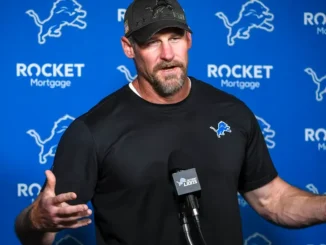
The Detroit Lions have made remarkable strides in recent seasons, emerging from years of mediocrity to become genuine playoff contenders. But in the midst of this resurgence, there’s a looming question about one high-profile player: **Jared Goff**. With a $76 million contract extension in hand, the veteran quarterback has been both a symbol of the team’s growth and a source of frustration. Could a trade involving Goff be on the horizon as the Lions look to solidify their championship aspirations?
Goff, who was acquired from the Los Angeles Rams in 2021 as part of the blockbuster Matthew Stafford trade, has shown both promise and limitations in his time with Detroit. While he’s certainly played a large role in the team’s offensive success—particularly in his ability to manage games and connect on short-to-intermediate throws—his performances in high-pressure moments have been inconsistent. In big games, Goff’s decision-making and ability to lead the offense to critical wins have often been questioned. His occasional tendency to turn the ball over at inopportune times has been a cause of concern for a franchise on the rise.

Despite the Lions’ strong supporting cast—including an emerging offensive line and a dynamic running game—Goff’s limitations as a top-tier quarterback have become more glaring. Detroit has made no secret of its ambition to compete for a Super Bowl in the near future, and with Goff’s $76 million contract, the pressure is mounting for him to take the next step.
This leads to the potential trade rumors. With the Lions’ front office focused on building a championship roster, could they look to trade Goff for a more dynamic, high-upside quarterback? As the league’s quarterback market continues to shift, Detroit may need to consider whether keeping Goff at such a high price is the right move or if an upgrade at the position would better suit their long-term goals.
As the 2024 season unfolds, all eyes will be on Goff—will he continue to lead the Lions forward, or will Detroit decide it’s time to move on from their $76 million signal-caller?



Be the first to comment